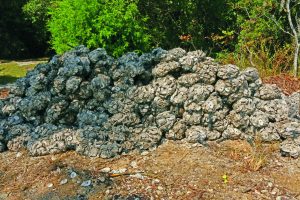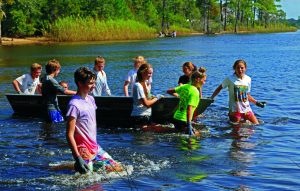

45 freshmen from Seacoast Collegiate High School poured out of a yellow school bus at the edge of Alaqua Bayou, ready for a wet, educational morning in the bay with the Choctawhatchee Basin Alliance (CBA).
Opening its doors in 1996 – the same year CBA was founded – Seacoast remains one of the oldest charter schools in the State of Florida still in operation. Field experience is an important part of the student curriculum, and because CBA and Seacoast share a South Walton campus, partnerships between the organizations are a natural fit.
The students were split into two groups. The first began to unload oyster shell bags from the back of a CBA trailer, passing them from one to another to carefully load up two aluminum boats full of shell before wading to the oyster reef sites. As they worked, a small group of students began singing A Capella, their voices echoing across the calm surface of the water. Others laughed and joked, at first hesitant to get their feet wet, then totally committed. Once completed, the oyster reefs will both reduce erosion and supply critical habitat for marine creatures, as the second group quickly discovered.
While their fellow students began building, the second group worked with Education Coordinator Brittany Tate in a small clearing at the bayou shoreline. After a quick fish morphology introduction, the freshmen hit the water with long seine nets as well as smaller dip nets to collect species from in and around the oyster reefs. Depositing their finds in gallon buckets, complete with bubblers to keep the critters comfortable, the students used fish identification booklets to analyze the shape of the mouth, the curve of the tail, the color of the scale, and more from each fish and crab before settling on the correct species. For many, this was the first time they had come face to face with the native aquatic species of Choctawhatchee Bay. By the end of the morning, both groups had identified gobies, croaker, mojarras, and more.
“It’s always great to have Walton County students work on a Walton County project, and they are right here in our backyard so after watching us prepare for work on these sites they get to participate in it,” explains Alison McDowell, Director of CBA, “Additionally, building reefs and learning about native species in the Choctawhatchee bay is an excellent service learning opportunity.”
Tate agrees, “This activity showed the students the species and critters that are directly benefiting from restoring the oyster habitat that they were helping to build.”
As noon approached both groups packed up their equipment and returned to the bus, ready for some dry clothes and an afternoon of traditional classes. Field experiences not only are impactful ways to teach science and restoration, but inspire students to become water stewards in their own day to day lives.
“Having the students aware of the effort CBA makes when restoring habitat was critical,” says Annette Railey, their biology teacher, “Students benefited from the physical aspect of what it takes to put the oyster reef together.”
For more information on field experiences with CBA, check out their Facebook page at facebook.com/basinalliance.

Be the first to comment on "Choctawatchee Basin alliance"